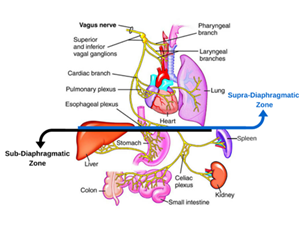It’s hard to be anxious, sad or angry when we are counting our blessings. This makes sense but it can be hard to see bright spots when life is throwing curve balls at us every day. The real curve ball is that, by practicing gratitude, we can actually avoid becoming anxious, sad or angry when faced with challenges. There is some pretty amazing science behind why practicing gratitude improves our mental and physical well-being.

According to Justin Hersom, LCSW at Adventist Health Tillamook, “it is natural for us to have a slight negative perception in life, as it helps us stay safe.” He goes on to say, however, that people tend to “over-practice” negative perception and then struggle to notice positive things in life. “Learning to stay present inhibits anxiety and learning to develop gratitude shifts neuropathways which can allow us to experience more fulfilling interactions and events in life.” As part of his practice, Justin often guides clients toward gratitude practices, such as daily gratitude journals of 3 to 4 things a person is grateful for that day, no matter how big or small; “and it can’t be the same thing daily.” He points out. “Sometimes we are not in a place to experience gratitude. In that case, working with a mindful belief system, we can just try to have the desire to be grateful.”
These good feelings are not just fleeting. A regular practice of gratitude or mindfulness, especially if we include deep breathing, can be a game changer when it comes to our health. Just as it takes time and intentionality to build other healthy habits, over time, a regular practice of mindfulness can change the way the body functions, reversing the negative impacts of chronic stress. As part of his Lifestyle Medicine program at Adventist Health Tillamook, Dr. Ben Douglas shares that “patients who struggle with anxiety or depression often tell me they have trouble sleeping at night because their brain won’t be quiet. Mindfulness and deep breathing are techniques that can teach your brain that it is ok to be quiet and go to sleep.”
Health Impacts of Deep Breathing Practices
“Take a deep breath. You got this.” This is the advice my son’s baseball coach gave each player as they approached the batter’s box. What do we do when we have to speak publicly and are nervous? We take a deep breath. What do we tell a child who is crying, upset or angry and trying to tell us what happened? Yep. “Take a deep breath.”
We know deep breathing helps us calm down in stressful situations. The reality is that most of us live in a chronic state of stress. This deep breathing helps regulate the body’s stress response. And, just like a baseball player’s batting average gets better with practice, our bodies adapt to a regular mindfulness practice in ways that make the body more efficient and healthier.
A growing body of research shows that mindfulness and deep breathing techniques make positive changes to virtually every system of the body. When performed consistently, deep breathing practices have been shown to lower blood pressure, reduce stress, anxiety and pain and offer many other mental and physical benefits.
When our nervous system is calm, we feel safe and are better able to handle stress when it comes our way. We can keep things in perspective, avoid overreacting emotionally and have healthier relationships with others. This practice can also improve our executive brain function and memory. This is because chronic stress engages a part of the brain that “turns off” our planning and organizing brain (pre-frontal cortex) and “turns on” the fight-flight or freeze part of our brain (amygdala).
So how does it work exactly? There is a muscle in our body, the diaphragm, that is like a shelf between the heart, lungs and other organs. There is also a long nerve, called the Vagus nerve, that connects to all those organs. When we breathe deeply, the movement of the diaphragm and the activation of the Vagus nerve, shifts our body and mind from “fight-flight-freeze” to “rest and digest.” Our heart rate decreases, we get more oxygen to all the parts of the body, including the brain, and levels of stress hormones like cortisol are reduced. All of these changes reduce inflammation in the body which can prevent chronic diseases like heart disease, stroke, type 2 diabetes and cancer.
 So how does it work exactly? There is a muscle in our body, the diaphragm, that is like a shelf between the heart, lungs and other organs. There is also a long nerve, called the Vagus nerve, that connects to all those organs. When we breathe deeply, the movement of the diaphragm and the activation of the Vagus nerve, shifts our body and mind from “fight-flight-freeze” to “rest and digest.” Our heart rate decreases, we get more oxygen to all the parts of the body, including the brain, and levels of stress hormones like cortisol are reduced. All of these changes reduce inflammation in the body which can prevent chronic diseases like heart disease, stroke, type 2 diabetes and cancer.
So how does it work exactly? There is a muscle in our body, the diaphragm, that is like a shelf between the heart, lungs and other organs. There is also a long nerve, called the Vagus nerve, that connects to all those organs. When we breathe deeply, the movement of the diaphragm and the activation of the Vagus nerve, shifts our body and mind from “fight-flight-freeze” to “rest and digest.” Our heart rate decreases, we get more oxygen to all the parts of the body, including the brain, and levels of stress hormones like cortisol are reduced. All of these changes reduce inflammation in the body which can prevent chronic diseases like heart disease, stroke, type 2 diabetes and cancer.
It might feel awkward at first to try a mindfulness practice but, just like with other new activities, it gets easier with regular practice. The good news is that it can be done anywhere, only takes a few minutes and it costs nothing.
Here are a few resources to help you get started:
- Qigong Breathing Video Demonstration and Cues
- In Breath: Deep, slow inhale through the nose, fully inflating the lungs, belly visibly rising/extending for 3-4 seconds.
- Out Breath: Slow, controlled outbreath through the nose, belly draws in, diaphragm up, fully exhaling for 5-7 seconds
In his practice, Justin Hersom encourages clients to practice the cycles of inbreaths and outbreaths for 3 to 5 minutes at a minimum.
If you are struggling with anxiety, depression, chronic pain or are experiencing other mental health concerns, please contact your primary care provider.
For more local health and wellness information, go to www.tillamookcountywellness.org, follow Tillamook County Wellness on Facebook, Instagram and Twitter.


